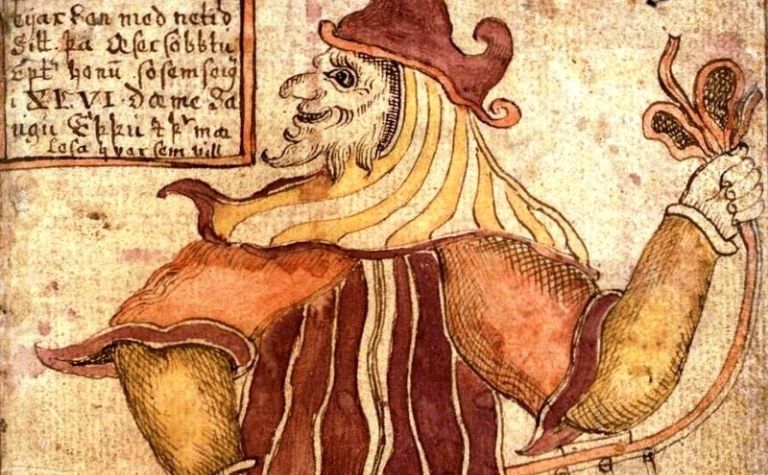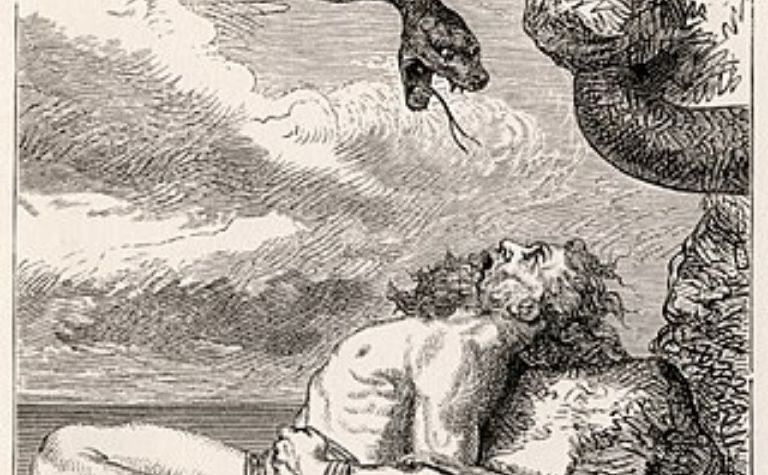Loki is a popular mythological figure with a complicated history. In the original Marvel movies, Loki plays the role of a bitter villain, and later on, his character becomes more sympathetic.
But in the original Norse myths, is Loki actually an evil god?
Loki is not an evil god in Norse mythology. He is a god of chaos and trickery, but he’s not evil.
As the god of mischief, he often plays tricks on human beings and the other gods.
Sometimes his tricks result in death and destruction, but his intentions are never evil.
This article will discuss why Loki is not evil and outline some of the things that the character does in the original Norse myths.
Also, see What Does Loki Look Like in Norse Mythology? to learn more.

What Evil Does Loki Do in Norse Mythology?
In Norse mythology, Loki performs several acts that result in great anger or tragedy from the gods.
He isn’t evil, and his intentions aren’t malicious but rather playful.
Two of the major stories Loki appears in, the Lokasenna and the Death of Baldur, directly lead to the events of Ragnarok, the end-of-the-world myth in Norse mythology.
These stories don’t illustrate evil but an innate sense of chaos and mischief.
Death of Baldur
Baldur is one of the most beloved gods in Asgard and the son of Odin and Frigg. Frigg loves Baldur so much that she goes to everything in the world and makes them swear not to harm Baldur.
It became common for the gods to throw various items and weapons at Baldur and watch him leave completely unharmed.
Loki learned that mistletoe was the only thing that did not swear the oath against harming Baldur, so he created a spear of mistletoe and made sure Baldur was killed with it.
The gods were so upset that the whole world wept, and Frigg helplessly tried to save Baldur from the death goddess, Hel.
This is by far the evilest thing that Loki does in the ancient Norse myths.
Lokasenna
In the Lokasenna, Loki arrives at a banquet for the gods to which he wasn’t invited.
Loki exchanges insults with Odin, Odin’s wife, Frigg, and Thor’s wife, Sif.
Thor finally interrupts and threatens Loki, which prompts him to finally leave.
Loki disguises himself as a salmon and hides in a waterfall, but the gods catch him.
After the death of Baldur, which the gods also recognized as a sign of the coming of Ragnarok, they decide to bind Loki with chains in a cave.
Loki has poison dripped on his face and will remain in this spot until the end of time.
Ragnarok
Technically, Ragnarok hasn’t happened yet. The Norse prophesied that a harsh winter would come and wipe out most of the life on Earth at the end of the world.
Meanwhile, most of the gods will face their enemies in a battle to the death. The world will then either end or be remade.
Loki plays an important role in Ragnarok. He will break free from the bindings of the gods and build an army of giants.
Then, he will lead this army to destroy the world and eventually die in battle with the god Heimdall.
Also, see How Is Loki a God If He Is a Frost Giant? to learn more.

Are Loki’s Family Members Evil?
Loki gave birth to several children in male and female form, but his most famous progeny, Jorgmungandr, Hel, and Fenrir, are also associated with “evil.”
The giantess Angrboda conceives them with Loki, and all of them make intimidating figures in Norse mythology. But are they evil?
Jormungandr
Jormungandr is a sea serpent that wraps around the world and holds its tail in its mouth. His natural enemy is Thor, and the two have several battles throughout the Norse tales.
During Ragnarok, Jorgumandr and Thor will kill each other once and for all.
Jormungandr antagonizes Thor, but he is never represented as evil. He has a natural place in the cosmos, and his matches with Thor always end with neither one winning.
Hel
Hel is the goddess of the underworld and one of Loki’s other children. The only myth in which she features prominently is the myth of Baldur, where Frigg begs her to release her beloved child.
Hel responds that she will let Baldur live again if Frigg can get everything in the universe to weep for Baldur.
Loki, disguised as a giantess, refuses to weep, so Baldur stays in the underworld with Hel.
Hel is a little cruel and cold, but it would be a stretch to call her evil.
Her role is to rule over the underworld and the dead. Making an exception for Baldur might betray her values.
Fenrir
Fenrir is a wolf who the gods learned early on was growing too strong to control. They chain him up but convince him that the practice is simply a test of his strength.
When Fenrir grows suspicious, the gods have a chain forged by the dwarves to hold him for eternity and place a sword in his mouth to keep his jaws open.
Fenrir will remain there, tortured, until Ragnarok, when he leaves a path of destruction in his wake and then kill Odin.
Fenrir is destined to kill the ruler of Asgard, but his sympathetic tale of torture makes him impossible to classify as evil. He didn’t kill anyone before being chained up.
Just like Loki, none of his children could be called “evil” in the classical sense of the word.
Also, see How Did Loki Become a God? to learn more.
Who Are Loki’s Enemies and Rivals in Norse Mythology?
Loki and the god Heimdallr are said to be natural enemies and are fated to kill each other in the events of Ragnarok.
However, there are few other instances of the two interacting in mythology other than in the Lokasenna. Other than that, Loki has no rivals.
He sometimes plays tricks on the gods that have disastrous results, but he also helps the gods at various times.
He helps Thor find his hammer and gives birth to Odin’s favorite steed, Sleipner.
Conclusion
Just like Thor is innately honorable and Odin is innately wise, Loki is innately mischievous and chaotic. He’s neither good nor evil; simply complicated.
